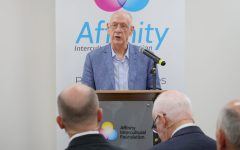“Gay people exist and you can’t change us”: Michael Kirby delivers stirring speech on LGBTQIA rights
August 17, 2018 2022-05-16 5:56“Gay people exist and you can’t change us”: Michael Kirby delivers stirring speech on LGBTQIA rights
“Gay people exist and you can’t change us”: Michael Kirby delivers stirring speech on LGBTQIA rights
On Thursday, 16 August, Affinity Intercultural Foundation hosted a special Lunchtime Lecture with two highly distinguished Australian law figures: former Justice of the High Court, Hon Michael Kirby AC and the University of Sydney’s Emeritus Professor Ron McCallum.
In a conversation titled Interpersonal Relationships and Human Rights, the pair discussed the issues that are faced by people within the LGBTQIA community, as well as those living with a disability.
Michael began by sharing how the socio and political climate of his youth affected his coming out journey, making it a painful and harrowing experience.
“When I was growing up, I discovered that I was gay. I knew it wasn’t a good feeling because you had to be thoroughly ashamed of it and bottle it up, hiding it from your family and loved ones.” he said.
“Every second week, there was a news story about police trapping a gay person.”
He also shared personal anecdotes from a life shared with long-term partner, Johan von Vloten, including the time they spent travelling through Europe in a kombi van.
After 50 years together, Michael joked that he and Johan are still unsure about marriage, citing that it was, “too soon to tell”.
The one message that Michael wanted his audience to remember from his talk?
“Gay people exist. You can’t change us. We can’t change us. We won’t disappear and we’ll just keep popping up. This time, young people will speak up.”
Ron McCallum continued the conversation by imploring that we must remain vigilant to ensure the rights of people with a disability are protected.
“Many years ago, disability was seen as a result of some wrong done by our parents or grandparents. In some nations, people without a disability were not seen as full citizens, and were not even allowed full voting rights,” he said.
“We must be vigilant to protect human rights. We cannot stand still.
“It’s important that we teach people with cognitive disabilities about relationships and the nature of equality. Everyone has the right to sexual expression.
“We should always be seen for the fullness of our humanity. Part of that, is the richness of expressing love and sexuality, and the empathy that can spring from that.” he said.



